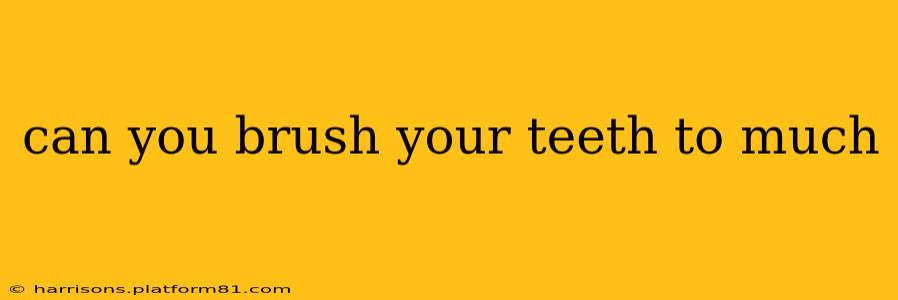Can You Brush Your Teeth Too Much? The Truth About Overbrushing
The short answer is yes, you absolutely can brush your teeth too much. While regular brushing is crucial for maintaining good oral hygiene, excessive brushing can lead to several problems, harming your teeth and gums more than it helps. This article will delve into the potential consequences of overbrushing and guide you towards a healthy brushing routine.
What Happens If You Brush Too Hard?
Overzealous brushing, even with a soft-bristled brush, can cause damage. The aggressive scrubbing action wears away tooth enamel, the protective outer layer of your teeth. This enamel erosion makes your teeth more vulnerable to cavities, sensitivity, and discoloration. You might also notice your gums receding, exposing more of your tooth roots and making them more susceptible to decay and infection.
How Often Should You Brush Your Teeth?
The general recommendation is to brush your teeth twice a day, for a minimum of two minutes each time. This consistent routine ensures the removal of plaque and food particles that contribute to cavities and gum disease. However, the how is just as important as the how often.
What are the signs of overbrushing?
Several telltale signs indicate you might be brushing too hard or too often:
- Sensitive teeth: Pain when consuming hot, cold, sweet, or acidic foods and drinks is a common symptom of enamel erosion.
- Receding gums: Your gums might appear to be pulling away from your teeth, exposing the roots.
- Bleeding gums: While some bleeding can occur with regular brushing, persistent bleeding is a sign of gum irritation or damage.
- Worn-down enamel: Your teeth may appear shorter or more translucent than before. Your dentist can easily spot this during a check-up.
Can you brush your teeth too often with an electric toothbrush?
While electric toothbrushes can be effective at cleaning teeth, it’s still possible to overbrush with them. The rotating or oscillating heads can be abrasive if used too vigorously or for excessively long periods. Follow the manufacturer's instructions regarding brushing time and pressure. Many modern electric toothbrushes have built-in pressure sensors to alert you if you are brushing too hard.
What's the best way to brush your teeth?
The key is gentle, consistent brushing. Use a soft-bristled toothbrush and apply minimal pressure. Use a gentle back-and-forth motion, focusing on cleaning each tooth individually. Don’t forget to brush your tongue gently to remove bacteria.
How do I know if I need to see a dentist because of overbrushing?
If you notice any of the signs mentioned above—sensitive teeth, receding gums, bleeding gums, or worn enamel—schedule an appointment with your dentist immediately. They can assess the damage, recommend appropriate treatment, and advise you on proper brushing techniques. Early intervention can often prevent further complications.
Remember, effective oral hygiene is about consistency and technique, not brute force. A gentle, twice-daily brushing routine, coupled with regular dental check-ups and professional cleanings, is the best way to ensure a healthy and bright smile for years to come.
